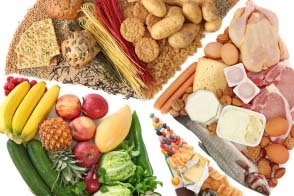![Low Milk Production [Illustration by Shinod AP] Low Milk Production [Illustration by Shinod AP]](../../wordpress/wp-content/uploads/2013/06/diet-4_1.gif)
Low Milk Production [Illustration by Shinod AP]
Also try to be as comfortable as you can when the baby is suckling. Try to spend some time with your baby before you actually feed her. Allow her to fondle you. As she fondles, your own stomach muscles are likely to contract, which will naturally tone your stomach.
If the problem is low milk production, try some of these suggestions:
- Try drinking one cup of soyabean milk everyday. It tastes nice when flavoured.
- Before breastfeeding, make sure to drink a glass of water so that there is an intake of fluid which can convert itself into milk later. In fact, water acts as a tonic and increases milk production to a great extent.
- Eat plenty of vitamin B-rich foods such as legumes, peanuts and black grams. In vegetables, you can eat all types of beans – string, French beans and flat beans. Pomegranates and grapes are a good source of iron, guavas beat constipation and papaya contains a lot of vitamins and minerals.
- Have five small meals instead of three large ones.
- Garlic is great during this time. Try having a clove a day, as it has plenty of sulphur, which is good for the joints and also aids milk production.
- Your first milk or colostrum, should not be thrown away. It has antigens, which immunise the baby immediately after birth. Put it in your child’s eyes to protect her from conjunctivitis, a common ailment among newborns.
- Bittergourd juice after delivery is excellent for the mother. It works as a natural curative.
- If you have a cough problem, try having tulsi leaves with ghee first thing in the morning. If you are able to do this over a long period of time, it will reduce flatulence.
- Have a lot of yeast as it is high in vitamin B, which increases milk flow.
- Fenugreek (methi) leaves and seeds are also useful since it is a natural blood cleaner and curative.
- Try honey in large doses. You can use as a sweetener with milk and desserts.










